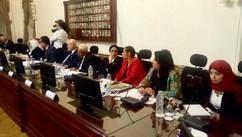Literacy
is essential for the achievement of human rights. It is also the foundation for
lifelong learning as well as of a better quality of life when conceived as an
integral part of the 2030 Agenda for Sustainable Development. Based on its
extensive experience and special mandate in the field of literacy/ non-formal/
and lifelong learning, UNESCO supports Member States through advocacy for a
stronger commitment to literacy, and by strengthening a knowledge base,
enhancing national capacities, and supporting reinforcement of effective
literacy programmes.
Within this context, a 3-day
regional meeting of experts took place in Cairo/Egypt, on 16-18 May 2017, with
the aim of rethinking and launching a new vision for the Regional Sir El Layan
Center of Adult Education that will enable it to fulfil its mandate and respond
to the current and emerging needs of the region. This meeting, held under the
patronage of the Minister of Education in Egypt, was organized by UNESCO Beirut
in coordination with UNESCO UIL, UNESCO Cairo Regional Office and the Islamic
Educational, Scientific and Cultural Organization (ISESCO).
Since 2014, the UNESCO General
Conference has agreed to make the Sirs El Layan Centre a Category 2 center
under UNESCO’s auspices for supporting the regional efforts in literacy. The
Centre attempts to situate literacy within the broader development context. It
pays great attention to local community education and empowerment. Its mission
is to be a Centre of excellence in developing literacy and lifelong learning
programmes and policies, as well as strengthening non-formal education
institutions, and supporting institutions in quality assurance and
accreditation, building of human capabilities, catalyzing the creative
initiatives of lifelong learning and literacy at local, regional and
international levels, and finally, strengthening cooperation with UNESCO and
contributing to the national, regional and international literacy, adult
learning and lifelong learning agendas.
Regional and international literacy
experts, governmental and non-governmental organizations and decision makers
gathered for 3 days to discuss and chart out the Centre’s proposed strategy and
the way forward towards launching a Regional Alliance for Literacy in the Arab
States, and identified the potential network partners for this regional
alliance who can contribute to the advancement of the literacy agenda in the
region.


